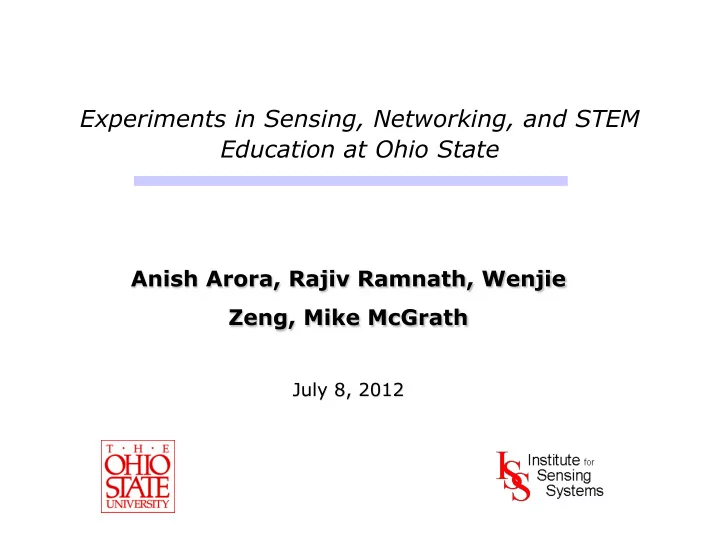

Experiments in Sensing, Networking, and STEM Education at Ohio State
The short story Hands-on projects involving networked sensor nodes in • our introductory courses in networking and distributed computing since ~2003 Evolved from graduate to undergraduate (2006) to high • school curricula (2010) 2
The short story Emphasis on experiments with real hardware • low power sensor arrays (motes, smartphones) live setting (application-oriented testbeds and projects) PeopleNet Stationary Array Dreese Sensor Array Occupancy Elevator Temperature Anchor Nodes 3
The short story Leveraging KanseiGenie and derivative infrastructure, and • continued plan for GENI “cloud” resources KanseiGenie ORCA Researcher Clearinghouse KanseiGenie sites: Kansei (OH), NetEye (MI), OKGenes (OK), TsingHua (CN) Web based portal for experiment control and data in-/ex-filtration 4
Teaching modus operandi Each offering has ~15 custom projects • 3 students per project (2, if team includes a grad student) each project has assigned grad expert Two hour tutorial on concepts, development environment, • and hello-world exercises TinyOS programming (in NesC), Android programming project resources and tutorial compilations shared online Pace through regular deliverables • demo env. setup (hardware & emulator), design report, … Per group exam • demo and written report evaluate design and conceptual understanding 5
Operational details (Sensor Network projects) TinyOS (historically, now shifting to .NET MF) • Pre-packaged VM, includes simulator, setup • VMSphere walled playground available WSN motes borrowed when needed • <100 used per quarter Provide server access for projects • Kansei arrays accessed via Researcher Portal web (mostly • by graduate students for networking research projects) increasingly these are about the physical layer 6
Sample projects: ThermoNet Fine-grain assessment of building comfort-efficiency • on average 47% comfortable area ill-conditioned rooms, alarms Localize temperature sensors • Spoof sensors to “fool” ThermoNet • fake alarm 7
Sample network security project Secured password backup manager for Android • Centralized management of passwords Backup in the cloud via Dropbox API 3 weeks of development delivers working Android app - but really 16 hours of effort 8
Science experiments for high schoolers 9
Operational details (STEM experiments @ school) Schools provide computer to run KanseiGenie VM image • each students gets a sensor node students use web browser to access local VM portal Image pre-loaded with apps; more apps available online • kit is stand-alone until user is ready for cloud resources kit array can be exposed to cloud as a programmable fabric OSU machines • to act as “Data Hub” , “App Store” , “STEM Social Network” run ORCA actors to shepherd kit arrays as resources in federated sensor arrays 10
Lessons Learned Undergraduates respond well to playing with device arrays • KanseiLite / kit infrastructure lowers barrier to • experimentation Helps to “can” the dev. environment, pace students through • initial learning curve with programming system most disasters at this stage sample programs (app notes) helped Extra credit and open-ended projects work for motivated • students 11
Recommend
More recommend